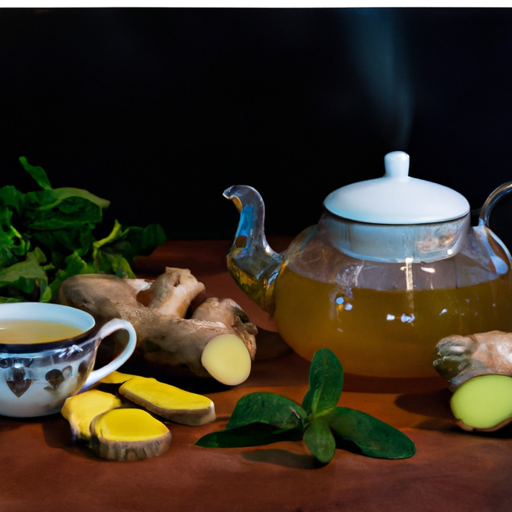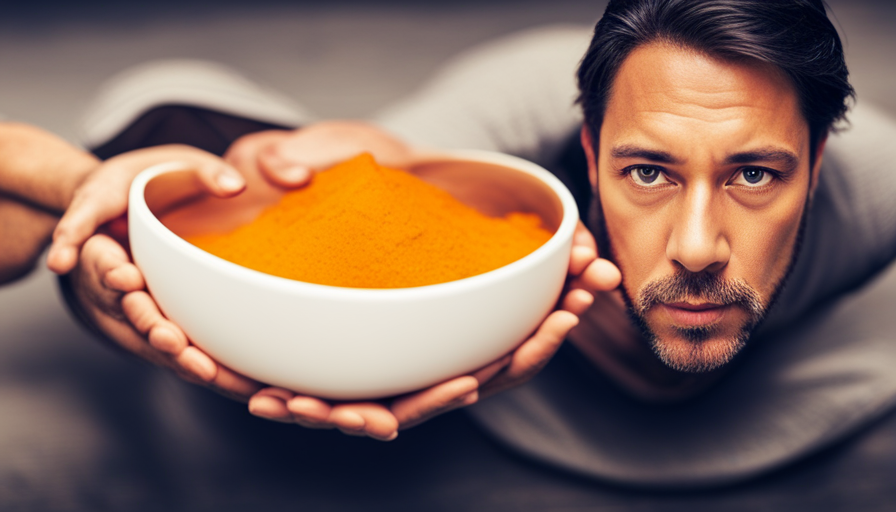As an individual constantly in search of natural solutions to enhance my well-being, I’ve recently developed an interest in turmeric tea.
Turmeric has been used for centuries in traditional Ayurvedic medicine to treat a variety of ailments, and it seems that modern research is starting to catch up with this ancient wisdom.
So, what exactly is turmeric tea for?
Well, there are many potential health benefits associated with drinking this spicy beverage.
From improving digestion and skin health to reducing inflammation and preventing chronic diseases like heart disease and cancer, turmeric tea may be a simple yet powerful way to support overall wellness.
In this article, we’ll explore what turmeric tea is, how it works in the body, and some of the specific ways it can benefit your health.
Key Takeaways
- Turmeric tea is a natural remedy with many potential health benefits.
- It contains curcumin, which has anti-inflammatory and antioxidant properties.
- Turmeric tea can be used for managing pain and inflammation, improving brain function, boosting immune system function, and regulating blood sugar levels.
- Fresh turmeric root is recommended for brewing to provide a richer flavor and adding black pepper can enhance the absorption of curcumin.
What Is Turmeric Tea?
Turmeric tea is a delicious and healthy beverage that’s packed with antioxidants and anti-inflammatory properties. It’s made by steeping turmeric powder or fresh turmeric root in hot water, along with other spices like ginger, cinnamon, or black pepper.
There are many different turmeric tea recipes out there that you can try, depending on your taste preferences and health goals. To make a basic turmeric tea at home, all you need is some ground turmeric powder and boiling water. Simply add one teaspoon of turmeric powder to a cup of hot water and stir until well mixed. You can also add other spices like ginger or cinnamon to enhance the flavor and health benefits of your tea. If you prefer fresh turmeric root, simply grate it into the hot water before adding any additional ingredients.
When it comes to consuming turmeric tea, there are many ways to enjoy this delicious beverage. Some people like to drink it first thing in the morning as part of their daily routine, while others sip on it throughout the day for an energy boost or as a natural remedy for various ailments. Whatever your preference may be, incorporating turmeric tea into your diet is a great way to improve your overall health and wellbeing.
Turmeric tea has many health benefits that make it worth adding to your daily routine. From reducing inflammation and boosting immune function to supporting brain health and preventing chronic diseases like cancer and heart disease, this powerful spice has been used for centuries in traditional medicine practices around the world. So why not give it a try? Your body’ll thank you!
Health Benefits of Turmeric Tea
Get ready to boost your health with the powerful benefits of this tasty beverage. Turmeric tea, also known as golden milk or turmeric latte, has been used for centuries in traditional medicine. It’s made by boiling fresh or dried turmeric root in water and adding other ingredients such as ginger, honey, cinnamon, and black pepper.
Compared to green tea, which is rich in antioxidants and anti-inflammatory compounds, turmeric tea has even more potent health benefits. One of the main health benefits of turmeric tea is its anti-inflammatory properties. Curcumin, the active compound found in turmeric root, has been shown to reduce inflammation in the body and alleviate symptoms related to inflammatory conditions like arthritis and asthma.
In addition to its anti-inflammatory effects, curcumin has also been linked to improved brain function and reduced risk of heart disease. Another benefit of drinking turmeric tea is its ability to boost immune system function. The high levels of antioxidants found in the drink can help protect against oxidative damage that can lead to chronic diseases such as cancer.
Additionally, studies have shown that curcumin may enhance immune cell activity and improve overall immune system function. Incorporating a cup of warm and flavorful turmeric tea into your daily routine can provide numerous health benefits. From reducing inflammation and improving brain function to boosting immune system function – it’s no wonder why this ancient spice continues to be a popular remedy today.
But just how does turmeric tea work? Let’s explore that next!
How Does Turmeric Tea Work?
Discover how this delicious and ancient beverage can work wonders for your health by exploring the science behind its powerful effects. Turmeric tea is known for its anti-inflammatory and antioxidant properties, which come from a compound called curcumin. Curcumin has been extensively studied in recent years, and research has shown that it may have a wide range of therapeutic benefits.
The mechanism behind turmeric tea’s clinical efficacy lies in its ability to modulate various signaling pathways in the body. For example, curcumin has been found to inhibit the production of pro-inflammatory cytokines, which are molecules that play a key role in inflammation. By reducing inflammation throughout the body, turmeric tea may help alleviate symptoms of conditions such as arthritis, asthma, and even cancer.
In addition to its anti-inflammatory properties, turmeric tea may also support overall health by improving brain function, lowering cholesterol levels, and boosting immunity. The table below summarizes some of the key clinical studies on turmeric tea and their findings:
| Study | Findings |
|---|---|
| A randomized controlled trial published in Phytotherapy Research | Turmeric extract improved symptoms of depression as effectively as Prozac |
| A study published in Molecular Nutrition and Food Research | Curcumin improved memory performance in older adults with mild cognitive impairment |
| A meta-analysis published in Critical Reviews in Food Science and Nutrition | Curcumin supplementation lowered total cholesterol levels |
With such promising evidence supporting its health benefits, it’s no wonder that turmeric tea has become increasingly popular over the years. In the next section, we will explore how it can be used specifically for digestive problems.
Turmeric Tea for Digestive Problems
If you’re feeling like your stomach is a battlefield, try incorporating this golden elixir into your routine to calm the storm and soothe your gut with its healing properties.
Turmeric tea has been used for centuries as a natural remedy for digestive problems and can help alleviate symptoms such as bloating, gas, and indigestion. The active compound in turmeric, called curcumin, has anti-inflammatory properties that can reduce inflammation in the gut lining and improve overall digestive health.
Turmeric tea is also rich in antioxidants which can protect against free radical damage caused by toxins in our environment and food. These antioxidants work to neutralize harmful molecules that contribute to inflammation and damage to our cells.
By reducing inflammation in the gut, turmeric tea may also help prevent chronic diseases such as inflammatory bowel disease (IBD) and irritable bowel syndrome (IBS), which are often associated with poor digestive health.
Incorporating turmeric tea into your daily routine is an easy way to support your digestive health using natural remedies. It’s important to note that while turmeric tea may be beneficial for some individuals with digestive issues, it’s always best to consult with a healthcare professional before starting any new supplements or making significant changes to your diet.
In the next section, we’ll explore how turmeric tea can also benefit skin conditions without any harsh chemicals or synthetic ingredients.
Turmeric Tea for Skin Conditions
Using this natural elixir can help improve various skin conditions, thanks to its anti-inflammatory and antioxidant properties. Turmeric tea has been used for centuries to treat eczema due to its ability to reduce inflammation and redness of the skin. It can also alleviate itching caused by eczema, which is a common symptom that affects many people.
In addition to eczema, turmeric tea can also be beneficial for acne-prone skin. Acne is often caused by inflammation and bacteria on the skin’s surface, both of which turmeric tea can help combat. The antioxidants found in turmeric tea may also support healthy collagen production, which promotes firmness and elasticity in the skin.
Furthermore, research suggests that turmeric tea may have other benefits for the skin such as reducing wrinkles and hyperpigmentation. Although more studies are needed to confirm these claims, incorporating turmeric tea into your skincare routine may be worth considering if you suffer from any of these issues.
Turmeric tea’s anti-inflammatory properties make it an excellent choice for those looking for natural ways to manage pain and inflammation in the body. By drinking turmeric tea regularly or applying it topically, you may experience relief from joint pain or muscle soreness without relying on over-the-counter medications with potential side-effects.
Turmeric Tea for Inflammation and Pain
To relieve inflammation and pain in your body, incorporating turmeric tea into your routine may be worth considering. Turmeric contains a compound called curcumin that has anti-inflammatory properties. Inflammation is the root cause of many chronic diseases such as arthritis, diabetes, and heart disease. By reducing inflammation in the body, you may experience relief from pain associated with these conditions.
The following table highlights some evidence-based benefits of drinking turmeric tea for inflammation relief and pain management:
| Benefit | Evidence |
|---|---|
| Reduces joint pain | A study found that curcumin was more effective in reducing joint pain than a nonsteroidal anti-inflammatory drug (NSAID) in individuals with knee osteoarthritis |
| Decreases muscle soreness | Curcumin supplementation reduced muscle damage and soreness after exercise |
| Improves symptoms of irritable bowel syndrome (IBS) | A study showed that taking curcumin supplements improved IBS symptoms such as abdominal pain and bloating |
In addition to these benefits, turmeric tea may also have a positive effect on heart health. The next section will explore this topic further.
Turmeric Tea for Heart Health
I love drinking turmeric tea, not only for its anti-inflammatory and pain-relieving benefits, but also for its ability to promote heart health.
Studies have shown that regular consumption of turmeric tea can help lower cholesterol levels, reduce high blood pressure, and prevent the formation of blood clots.
These three key benefits make it a great addition to my daily routine as I strive to maintain a healthy heart.
Lowers Cholesterol Levels
Turmeric tea can help keep your heart healthy by bringing down high cholesterol levels and making sure your arteries are clear. High levels of LDL or "bad"cholesterol can lead to the buildup of plaque in the arteries, which can increase the risk of heart disease and stroke. However, studies have shown that curcumin, the active ingredient in turmeric, can help lower LDL cholesterol levels and prevent plaque buildup.
In fact, a study published in the Journal of Nutrition found that taking turmeric supplements for eight weeks resulted in a significant decrease in total cholesterol levels compared to a placebo group. While there are benefits to taking turmeric supplements, drinking turmeric tea may be more beneficial as it allows for better absorption of curcumin into the body. Additionally, turmeric tea is a natural and delicious way to incorporate this powerful spice into your daily routine.
Furthermore, reducing high blood pressure is another important aspect of maintaining heart health. By incorporating turmeric tea into your diet along with other lifestyle changes such as exercise and a healthy diet, you can take steps towards improving your overall cardiovascular health.
Reduces High Blood Pressure
Incorporating turmeric tea into my daily routine has been a game changer when it comes to managing my high blood pressure. As someone who prefers natural remedies over prescription medication, I was thrilled to learn that turmeric contains compounds that help dilate blood vessels and promote healthy blood flow.
This spice also has anti-inflammatory properties, which can further reduce the risk of heart disease. Of course, drinking turmeric tea alone won’t magically lower your blood pressure overnight. It’s important to make lifestyle changes such as exercising regularly, reducing salt intake, and quitting smoking in order to see significant improvements.
However, adding this flavorful beverage to your diet can be a delicious and effective way to support your cardiovascular health. Speaking of which, did you know that turmeric also helps prevent blood clots? Let’s dive into that next!
Prevents Blood Clots
After learning that turmeric tea can help reduce high blood pressure, I was intrigued to learn about its other potential health benefits. One of these benefits is the prevention of blood clots – a condition where blood cells stick together and form a blockage within a vein or artery. Blood clots can be dangerous as they can lead to heart attacks or strokes.
Studies have shown that curcumin, the active ingredient in turmeric, has antiplatelet effects which prevent platelets from sticking together and forming clots. This property of turmeric makes it an excellent natural remedy for reducing stroke risk and preventing heart attacks. Incorporating turmeric tea into your daily routine may help you maintain a healthy cardiovascular system by lowering your chances of developing life-threatening conditions such as heart disease and stroke.
Moving on to the next section, let’s explore how turmeric tea can benefit those with diabetes.
Turmeric Tea for Diabetes
If you’re looking for a natural way to manage diabetes, try sipping on some delicious and healthy turmeric tea. Turmeric has been shown to have anti-inflammatory properties that can help improve insulin sensitivity and regulate blood sugar levels in people with type 2 diabetes. In fact, some studies suggest that turmeric may be just as effective as certain medications used to manage the disease.
To understand how turmeric tea can benefit those with diabetes, let’s take a closer look at its active ingredient: curcumin. Curcumin is a powerful antioxidant that can help reduce inflammation throughout the body, including in the pancreas where insulin is produced. By reducing inflammation in this key organ, curcumin may improve insulin sensitivity and help regulate blood sugar levels over time.
Here’s a quick overview of how turmeric tea can help manage diabetes:
| Benefits | Mechanisms |
|---|---|
| Reduces inflammation | Improves insulin sensitivity |
| Regulates blood sugar levels | Boosts pancreatic function |
Turmeric tea has been shown to offer numerous health benefits beyond just managing diabetes. Up next, we’ll explore how this powerful drink can also play a role in cancer prevention.
Turmeric Tea for Cancer Prevention
You can boost your cancer prevention efforts by adding a powerful anti-inflammatory ingredient to your daily routine. Turmeric, the bright yellow spice commonly used in Indian cuisine, has been found to have potent anti-inflammatory effects that may help prevent cancer. Chronic inflammation is known to contribute to the development of cancer, and turmeric’s ability to reduce inflammation makes it a promising tool for preventing this disease.
Studies have shown that curcumin, a compound found in turmeric, has strong antioxidant properties and can inhibit the growth of various types of cancer cells. In particular, curcumin has been found to be effective against breast, colon, prostate, lung, and pancreatic cancers. While more research is needed to fully understand how turmeric affects cancer prevention and treatment, early results are promising.
Incorporating turmeric into your diet is easy with turmeric tea. By drinking a cup of this tasty beverage every day, you can reap the potential benefits of its anti-inflammatory and antioxidant effects.
So let’s learn how to make turmeric tea at home!
How to Make Turmeric Tea at Home
I love making turmeric tea at home because it’s a simple and delicious way to enjoy the health benefits of this amazing spice.
In this subtopic, I’ll be discussing recipes and variations for making turmeric tea, as well as sharing some tips for brewing and serving.
Whether you’re new to making turmeric tea or looking to switch up your usual recipe, I hope these insights will help you create the perfect cup of soothing, anti-inflammatory goodness.
Recipes and Variations
Adding honey and ginger to your turmeric tea can provide a sweet and spicy variation, like how my friend enjoys her turmeric tea with a spoonful of local honey and freshly grated ginger. There are many other ways to enjoy this healthy beverage by adding different ingredients that complement the taste of turmeric. Here are some popular recipes and variations for you to try:
| Ingredients | Benefits | Recipe |
|---|---|---|
| Lemon Juice | Boosts Immunity | Add 1 tbsp lemon juice to hot turmeric tea |
| Cinnamon | Reduces Inflammation | Add 1 cinnamon stick or 1/2 tsp ground cinnamon to boiling water along with turmeric |
| Black Pepper | Increases Absorption of Curcumin (Turmeric’s Active Ingredient) | Mix 1/4 tsp black pepper powder with turmeric |
These simple variations can add more flavor, aroma, and benefits to your daily cup of turmeric tea. Experiment with different combinations until you find your favorite one. Now that you know about the various recipes and variations for making this delicious drink, let’s move on to some tips for brewing and serving it.
By following these tips, you can make sure that your turmeric tea is brewed perfectly every time, allowing you to savor all its flavors and health benefits.
Tips for Brewing and Serving
To fully appreciate the rich flavors and health benefits of this golden elixir, it’s important to know some tips for brewing and serving.
When it comes to brewing techniques, using fresh turmeric root is recommended as it provides a richer flavor compared to powdered turmeric. Simply grate or finely chop the root and steep it in hot water for at least 10 minutes before straining.
To add more depth in taste, you can also experiment with other ingredients such as ginger, cinnamon, honey, or black pepper. Adding black pepper can enhance the absorption of curcumin – the active compound in turmeric that gives its anti-inflammatory properties.
Once brewed, you can serve it hot or chill it in the fridge before adding ice cubes for a refreshing beverage on a hot day. You may also garnish with lemon wedges or mint leaves for added freshness.
Overall, turmeric tea is a versatile drink that can be enjoyed any time of day while reaping all its health benefits.
Frequently Asked Questions
Are there any side effects to drinking turmeric tea?
I’ve noticed that there are some potential side effects associated with drinking turmeric tea, but they tend to be mild and infrequent.
Some people may experience digestive discomfort or nausea, particularly if they consume high doses of the herb. However, many individuals report significant digestive benefits from consuming turmeric tea, including reduced inflammation and improved digestion.
As with any supplement or natural remedy, it’s important to follow recommended dosages and consult with a healthcare provider before making any significant changes to your diet or health regimen.
Can turmeric tea be consumed during pregnancy?
As someone who’s researched extensively on the topic, I can say it’s generally safe for pregnant women to consume turmeric tea in moderation. However, it’s important to consult with a healthcare provider before doing so.
Turmeric has numerous health benefits, such as reducing inflammation and aiding digestion. It also contains antioxidants that can help improve overall health. Nevertheless, excessive consumption of turmeric tea during pregnancy may lead to potential risks such as uterine contractions or bleeding.
Hence, while the consumption of turmeric tea during pregnancy may be beneficial for some individuals, one should exercise caution and seek medical advice before consuming it regularly.
Does turmeric tea have any impact on cholesterol levels?
Turmeric tea has a positive impact on cholesterol management due to its anti-inflammatory properties. Studies have shown that curcumin, the active ingredient in turmeric, can help reduce inflammation in the body. This inflammation is often linked to high levels of LDL (bad) cholesterol and heart disease.
In addition, turmeric tea can increase levels of HDL (good) cholesterol. This helps remove excess LDL from the bloodstream. While more research is needed to fully understand the effects of turmeric tea on cholesterol levels, incorporating it into a healthy diet and lifestyle may be beneficial for those looking to improve their cardiovascular health.
Is it safe to consume turmeric tea with other medications?
As the saying goes, "better safe than sorry,"it’s important to be cautious when combining turmeric tea with other medications. Turmeric contains compounds that can interact with certain drugs and potentially cause adverse effects.
It is always recommended to consult with a healthcare provider before consuming turmeric tea if you’re taking any medication. Your doctor can provide dosage recommendations and help determine whether or not it’s safe to consume turmeric tea alongside your current medications.
Remember, even natural remedies can have potential interactions and risks, so always err on the side of caution and seek professional advice before trying something new.
Does the type of turmeric used affect the effectiveness of turmeric tea?
The type of turmeric used can certainly affect the effectiveness of turmeric tea. It’s important to choose high-quality, organic turmeric for maximum health benefits. The active ingredient in turmeric, known as curcumin, has powerful anti-inflammatory and antioxidant properties that can help with a range of health issues from joint pain to heart disease.
To make turmeric tea, simply add a teaspoon of finely grated or powdered turmeric to boiling water and let it steep for about 10 minutes. You can also add other ingredients like ginger or honey for added flavor and additional health benefits.
Overall, incorporating turmeric tea into your daily routine can have numerous positive effects on your overall health and well-being.
Conclusion
So there you have it, folks – turmeric tea is a delicious and healthy beverage that has been used for centuries in traditional medicine. Its main active ingredient, curcumin, has been shown to have powerful anti-inflammatory and antioxidant properties that can benefit many aspects of health.
Including digestion, skin health, heart health, diabetes management, and even cancer prevention. In fact, a recent study found that daily consumption of curcumin was associated with improved memory and mood in older adults with mild cognitive impairment.
With all these benefits in mind, why not give turmeric tea a try? It’s easy to make at home using simple ingredients like fresh turmeric root or ground turmeric powder. So go ahead and brew yourself a cup today – your body will thank you!










